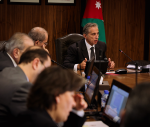You are here
Egyptians will not ‘just lie down’
Mar 19,2014 - Last updated at Mar 19,2014
Egypt’s interim President Adly Mansour argued in an interview aired this week that the country had made progress in implementing the roadmap drawn up in the wake of the ouster of president Mohamed Morsi last July.
He said ratification of the new constitution in January was a “key milestone in the transition to democracy”.
He also expressed support for the controversial Article 7 in the new presidential election law, barring candidate appeals against election results, insisting that appeals could delay final results and undermine the legitimacy of a president elect.
Mansour also said he did not know if army chief Abdul Fattah Al Sisi will run for president, and indicated that he had not yet decided, although Egyptian media claim he will announce his intention this week.
Mansour also contended that Sisi was not running the government but simply managing his defence portfolio.
The country should have a new president by June and a new parliament before mid-July, he said, arguing that “terrorism remains the main challenge facing Egypt”, while insisting that political restrictions will not return to pre-2011 uprising levels.
On the last point, Egyptian activists and revolutionaries dispute Mansour’s assertion.
Using the tool of the November law that bans unauthorised demonstrations, the security services have cracked down hard on dissent from all quarters.
Proceedings have been initiated against some, including political scientist and activist Amr Hamzawy, who has been charged with insulting the judiciary after he criticised a ruling against foreign non-government agencies for promoting democracy.
Others have been imprisoned, notably Ahmad Maher, co-founder of the April 6 youth movement that led the 2011 uprising, was sentenced to two years for protesting. Football ultras, independent activists, journalists and Muslim Brotherhood supporters have been swept up without distinction and jailed.
Among those jailed without charge is Alaa Abdel Fattah, who played a predominant role in the uprising. In October 2011, he was held for 30 days for allegedly inciting violence against the military, following the attack that killed 27 mainly Coptic Christian protesters outside the state radio and television building in Cairo.
In May 2006, he was held for 45 days for taking part in a peaceful rally calling for the independence of the judiciary.
Supporters recently marked his 100th day in his third period of detention. His aunt, prize winning Egyptian author and activist Ahdaf Soueif, told this writer he is in limbo. The authorities have not specified the court where he is due to appear for staging an unlicensed protest against military trials of civilians, an issue revolutionaries have campaigned for since the uprising.
Author of “My Cairo, Our Revolution” that appeared in 2012, Soueif argued that Egypt is “in a sense, where it was in 2010”.
The situation has not come full circle, but spiralled “so the repression… is much worse. And, conditions are worse.”
“Confrontations” with the authorities are going to “ebb and flow” but the revolution will roll on.
“It cannot quit because the conditions that gave rise to it continue to be in place.”
People have articulated their “dissatisfaction with these conditions and the wish for change”. Since young and mature activists have “invested” in a new future, they are “not going to let go”.
The revolution will “recede or go underground for a bit and [then] come back”. Unfortunately, while workers are staging strikes across the country, “ordinary people are challenging the protest movement” which has not yielded the changes Egyptians expected.
Consequently, “the street is not pursuing revolution. It is waiting to see what the new government will do”.
Will this government — whether headed by Sisi or not — “deliver what the people want. Will procedures be put in place to give the people a sense that we are heading in the right direction or will it be as it has been for three years? [So far] every government that comes in is more of the same”.
Soueif contrasted the approach of the current military establishment with that taken by president Gamal Abdel Nasser in the 1950s and 1960s.
He engaged the military in politics and industry as “part of a development plan” not so the generals could be “running seaside resorts” and water bottling plants for “personal gain”.
Pointing out that clinics and schools built during Nasser’s time are still serving the people of Upper Egypt, Soueif observed that people there say: “Everything that’s good, that’s from Nasser’s time. And it’s a real shame because Egypt has such incredible potential.”
She asserted: “What you have now is the military in power but allied with a class of crony capitalists. And that’s about the worse combination you can get…. Anyone who cares about the army and the army’s standing in the country would really want the army to do its proper job. To be protecting the country. Not to be hand-in-glove with the ministry of interior.... It’s a shame because the army is a popular institution despite [its] misbehaviour.”
Although Morsi’s ouster and the crackdown on the Muslim Brotherhood has enabled the military to recover some of its popularity, she warned: “It won’t last unless [senior military men] fix themselves.”
Despite the reverses Egypt has faced over the past three years, Soueif remains optimistic.
“I’m very hopeful. Not [for major change] in the next year or so. I think it’s going to have to come right because the alternative is too awful.”
In her view, Egypt’s current rulers “know in their bones that they are accountable. They know that people are not going to just lie down and go back to where they were”.












